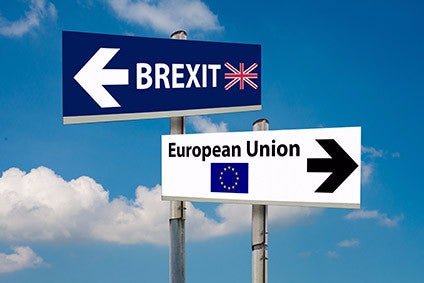
Germany’s powerful automotive industry association, VDA, is urging trading conditions with the UK and the European Union (EU) remain as they are as Britain starts to flesh out its wish list for leaving the Brussels body.
The VDA was reacting to UK Prime Minister, Theresa May’s speech earlier this week in London in which she confirmed the UK will not remain a member of the EU trade bloc’s Single Market but will seek access to it through a Free Trade Agreement, which she says could see the automotive sector using Single Market “arrangements.”

Discover B2B Marketing That Performs
Combine business intelligence and editorial excellence to reach engaged professionals across 36 leading media platforms.
Germany has a massive interest in securing the status quo between itself and its North Sea neighbour, with its automotive industry exporting more to Britain than to any other country in the world, with 810,000 passenger cars built in 2015, shipped to the UK.
The 2015 British passenger car market reached a record volume of 2.6m new cars, with half of them having a German group badge.
And in an impassioned plea for a continuation of current free trade arrangements, VDA president, Matthias Wissmann, warned of “severe economic consequences” were Britain to quit the Single Market as May is promising.
“For the German automotive manufacturers, the UK is the largest market for their exported passenger cars,” said the VDA chief in comments sent to just-auto from Berlin. “Conversely, the automotive industry in Britain accounts for 57% of all the country’s exports to the EU. So the British vehicle makers are hugely dependent on exports to the Continent.
“Automotive companies therefore have a major interest in the identification of solutions that enable the intensive trade and the associated value creation to continue as before.
“If Britain leaves the European single market this would have severe economic consequences on both sides of the Channel. The British economy is closely tied to the other EU countries: 44% of all exports from the UK go to the EU, while 53% of all imports into the UK come from the EU.
“Such a hard Brexit would be awkward and expensive. The consequence would be a long period of uncertainty. Years will go by before negotiations on new treaties are complete. Prospects like these scare investors away.”
The scale of nervousness across the English Channel can be gauged by both Wissmann’s comments and from the German suppliers assocation, the BME, in comments made to just-auto yesterday (19 January) by its general manager, Christoph Feldmann, who warned of a ‘poisonous’ effect of the UK leaving the EU, with the risk of contagion potentially spreading to other Member States.
“We have all no experience with it if a Member State leaves the EU,” said Feldmann. “This lack of clarity is a poison for any enterprise decision.”
Wissmann is acutely of the political machinations now surely underway between London, Berlin and a host of other EU capitals, as he himself was a former Transport Minister in Germany’s Federal Government headed by former Chancellor, Helmut Kohl.
His successor in the guise of Angela Merkel, has appeared to take a fairly hawkish line towards the non-negotiability in recent weeks of the so-called four pillars underpinning the EU, namely freedom of movement of people, goods, services and capital but it is the first of that list, which is proving a red line for the British Prime Minister.
The UK referendum authorising a withdrawal from the EU largely centred on a desire to control immigration across its borders and the British Premier – despite being what many have described as a “reluctant remainer” herself – is insisting London will leave the Single Market thereby appearing to scupper one of the four pillars.
Underlining that concern surrounding border control, SMMT chief executive, Mike Hawes at last year’s Business Summit in Venice, noted: “Business economics was not the motivation for the result. British people were concerned about immigration and sovereignty and a degree of scepticism to Brussels.”
The UK has indicated it will invoke Article 50 to formally inform the EU of its intention to leave the 28 Member State organisation by March 31, but May has also tantalising left an auto door slightly open with her comments regarding the Single Market.
“An important part of the new strategic partnership we seek with the EU will be the pursuit of the greatest possible access to the Single Market, on a fully reciprocal basis, through a comprehensive Free Trade Agreement,” said the Prime Minister.
“I want Britain to be able to negotiate its own trade agreements. But I also want tariff-free trade with Europe and cross-border trade there to be as frictionless as possible.”






